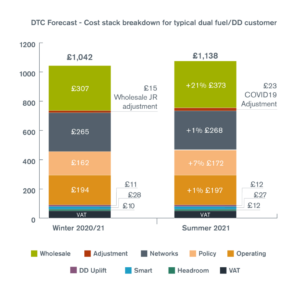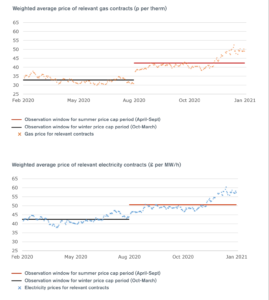The price cap will return to pre-pandemic levels from 1 April 2021, mainly due to changes in wholesale energy prices, Ofgem has announced today.
The price cap seeks to protect consumers who have not switched energy supplier by ensuring they pay a fair price for their electricity and gas.
Ofgem adjusts the level of the cap up or down twice a year to reflect the costs of supplying electricity and gas for suppliers.
According to the energy regulator, households on default tariffs are saving an estimated £75-£100 a year or £1 billion in total on their energy bills as a result.
Jonathan Brearley, chief executive of Ofgem, commented on the announcement: “Energy bill increases are never welcome, especially as many households are struggling with the impact of the pandemic.
“We have carefully scrutinised these changes to ensure that customers only pay a fair price for their energy.
“The price cap offers a safety net against poor pricing practices, saving customers up to £100 a year, but if they want to avoid the increase in April they should shop around for a cheaper deal.
“As the UK still faces challenges around COVID-19, during this exceptional time I expect suppliers to set their prices competitively, treat all customers fairly and ensure that any household in financial distress is given access to the support they need.
“The government and Ofgem have been working with the energy industry and consumer groups to support customers through this difficult time and I urge anyone worried about paying their energy bills to contact their supplier and access the help available.”

When wholesale prices fell sharply last year in the wake of the first lockdown, the level of the price cap fell by £84 in October to its lowest level yet for the current winter period.
Demand for energy has since recovered which has pushed wholesale prices back up to more normal levels.
For six months from 1 April the price cap will increase by £96 to £1,138 for 11 million default tariff customers, and by £87 to £1,156 for 4 million pre-payment meter customers.
According to the energy regulator, consumers who want to avoid the increase and save money should shop around ahead of the increase in the price cap on 1 April.
For the default tariff price cap level starting on 1 April, Ofgem has also allowed suppliers to claim £23 to cover higher levels of bad debt from more customers being unable to pay their energy bills due to the impact of COVID-19.
This seeks to ensure suppliers can continue to supply energy and protect their customers, especially those in vulnerable circumstances.
Suppliers are required to provide emergency credit to customers struggling to top up their pre-payment meters, put those who are behind on their bills on affordable repayment plans and should not disconnect their customers.
According to Ofgem, many have gone further in providing support over the last year, for example by helping pre-payment meter customers who are shielding to top up.

Data sets behind this graph are proprietary, and can be sourced from ICIS.
More information about this decision can be found from the Ofgem website.